5 Ways Scrolling is Ruining Your Sleep
Posted: November 30, 2023 | By: Shanon Peckham

We manage so many of our daily wants and needs through our smartphones; they’re our everything. With all of our favorite shows, games, memes, music, news, podcasts, and other important apps available 24/7, it’s tempting to never put these devices down. Despite their incredible usefulness, our phones are getting in the way of a good night’s rest and may be damaging our health over the long term.1
In order to build a healthier sleep routine, we first need to address why spending time on our phones can be so disruptive. These are some of the main reasons you’re glued to your phone way past your bedtime and why this habit is bad for sleep:
1 – Blue Light
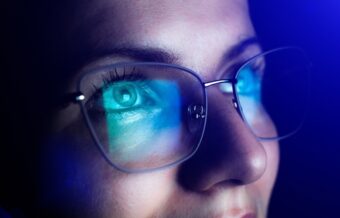
The human circadian rhythm, which controls our sleep-wake cycle, is controlled in part by the brightness and color of the light around us.2 Once you start messing with the lighting, you may have a hard time sleeping normally. This is because the blue light emitted from our screens tricks our circadian rhythm into believing it’s daytime, even when it’s late at night. This makes our brains more active at night than they should be, which can keep us up later or cause us to sleep poorly.3 The blue light can also disrupt our body’s normal production of melatonin,4 which helps induce sleep, so we may struggle to fall asleep after nightly phone use, no matter how brief.
2 – Positive Reinforcement
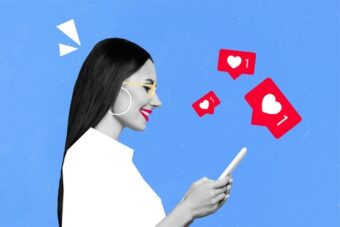 Our phones are also keeping us up too late by messing with our ability to relax properly for sleep. Our brains get too excited to turn off, thanks to the dopamine we produce by engaging with social media and our favorite entertainment at night. As Harvard Health pointed out, “Every notification, whether it’s a text message, a ‘like’ on Instagram, or a Facebook notification, has the potential to be a positive social stimulus and dopamine influx.” In other words, we’re addicted to feeling good via our phones, which keeps us on them late into the night when we should be resting.5
Our phones are also keeping us up too late by messing with our ability to relax properly for sleep. Our brains get too excited to turn off, thanks to the dopamine we produce by engaging with social media and our favorite entertainment at night. As Harvard Health pointed out, “Every notification, whether it’s a text message, a ‘like’ on Instagram, or a Facebook notification, has the potential to be a positive social stimulus and dopamine influx.” In other words, we’re addicted to feeling good via our phones, which keeps us on them late into the night when we should be resting.5
3 – Doomscrolling
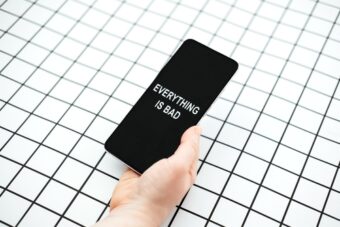
When it comes to the content we crave, it’s not all sunshine and rainbows – some of us are staying up late doomscrolling. The phrase, which was popularized at the start of the pandemic,6 means to consume bad news and/or depressing content for long periods of time.7 We started out doomscrolling to keep an eye on COVID numbers, protests, and other big news in 2020 – and we never stopped. It doesn’t help that much of today’s content is also designed to hook you using negative emotions (like fear, anger, or sadness) to try and keep you online longer (or buy a product). If you don’t believe us, check out the marketing article “Fear in Advertising”8 on LinkedIn. According to recent research, this nightly addiction to doomscrolling is contributing to sleeplessness, poorer mental health, and substandard physical health.9
4 – Revenge Bedtime Procrastination
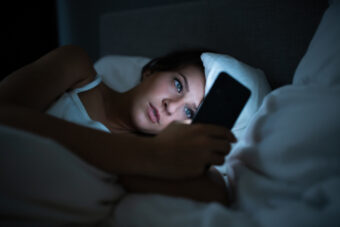
We all know the feeling. “Just one more episode,” we say to ourselves before binge-watching the rest of the season in one sitting. Before you start beating yourself up, know that it’s not just a lack of self-control at play here. Revenge bedtime procrastination, another term popularized in 2020, refers to purposefully putting off sleep to enjoy more free time.10 Sound familiar? It turns out that many of us are driven to sacrifice precious hours of sleep in favor of some fun due to our daytime stressors and busy schedules.11 We often spend this time on our phones scrolling, but the cost can be so detrimental to our health. Because we’re sleep-deprived, we feel worse during the day, which can drive our moods down and cause us to overcompensate by spending even more time scrolling.
5 – Disassociation and Addiction
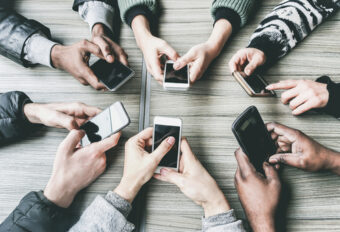
If it feels impossible to get away from your phone, don’t worry – you’re not alone. As many as 48% of the roughly 17,000 U.S. residents who partook in a 2022 Statista survey stated they were addicted to their digital devices.12 Internet addiction plays a huge role in sleepless nights, and science says it may even alter the way we think. According to a 2019 study,13 the flood of information we’re constantly exposing ourselves to may impact the brain’s ability to focus and process memory. It may also cause us to dissociate from reality, which may leave us feeling unsettled, disconnected from loved ones, or even separated from our own bodies.14 Yikes!
How to Break the Cycle
The good news is that it is possible to break this cycle with a little bit of determination and self-control. Restoring a healthy sleep routine starts with turning off your screens (yes, that includes your tablet, television, computer, and console too) and finding ways to live in the moment. If you can realign your circadian rhythm with natural darkness and break away from the noise of the internet for at least 30 minutes each night, you may be surprised how much easier it is to get to sleep, stay asleep, and wake up feeling rested. You can also try our new Beyond Sleep System, which is designed to help you wind down for the night. Relax with magnesium, rest with vegan melatonin, and help your body recover with amino acids.
Want more tips on how to get a good night’s sleep? Click here to learn more.
SOURCES
1 5 Ways Sleep Deprivation Impacts Your Health, 2023
2 Circadian Rhythms, National Institute of General Medical Sciences
4 Blue light has a dark side, Harvard Medical School, 2020
5 Dopamine, Smartphones & You: A battle for your time, Harvard University Science in the News, 2018
6 Doomscrolling, Oxford Learner’s Dictionaries
7 The darkly soothing compulsion of ‘doomscrolling’, BBC, 2021
10 The psychology behind ‘revenge bedtime procrastination’, 2020
11 What Is “Revenge Bedtime Procrastination”?, Sleep Foundation
12 Digital device addiction among users in the United States as of September 2022, Statista
13 The “online brain”: how the Internet may be changing our cognition, 2019
14 What Are Dissociative Disorders?, American Psychiatric Association
Posted in:

